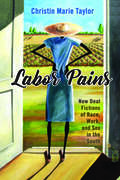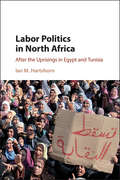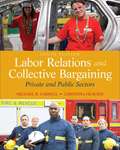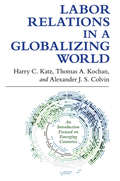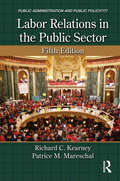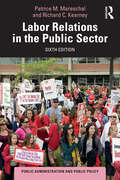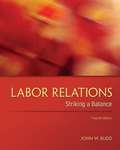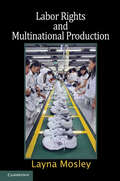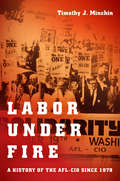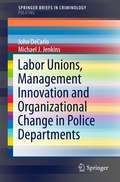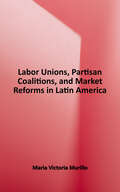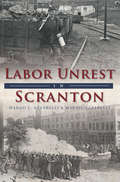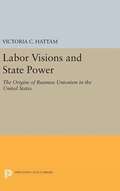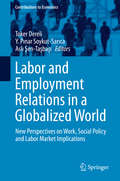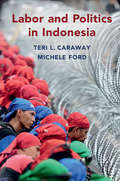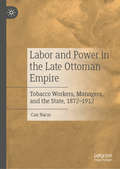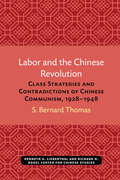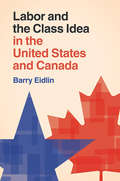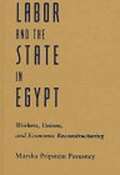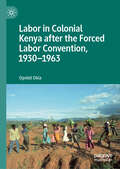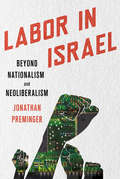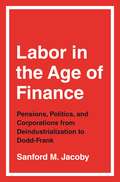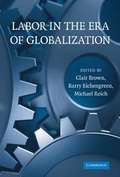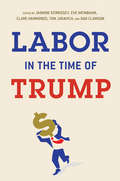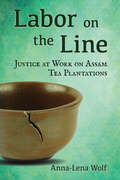- Table View
- List View
Labor Pains: New Deal Fictions of Race, Work, and Sex in the South (Margaret Walker Alexander Series in African American Studies)
by Christin Marie TaylorFrom the 1930s to the 1960s, the Popular Front produced a significant era in African American literary radicalism. While scholars have long associated the black radicalism of the Popular Front with the literary Left and the working class, Christin Marie Taylor considers how black radicalism influenced southern fiction about black workers, offering a new view of work and labor.At the height of the New Deal era and its legacies, Taylor examines how southern literature of the Popular Front not only addressed the familiar stakes of race and labor but also called upon an imagined black folk to explore questions of feeling and desire. By poring over tropes of black workers across genres of southern literature in the works of George Wylie Henderson, William Attaway, Eudora Welty, and Sarah Elizabeth Wright, Taylor reveals the broad reach of black radicalism into experiments with portraying human feelings.These writers grounded interrelationships and stoked emotions to present the social issues of their times in deeply human terms. Taylor emphasizes the multidimensional use of the sensual and the sexual, which many protest writers of the period, such as Richard Wright, avoided. She suggests Henderson and company used feeling to touch readers while also questioning and reimagining the political contexts and apparent victories of their times. Taylor shows how these fictions adopted the aesthetics and politics of feeling as a response to New Deal–era policy reforms, both in their successes and their failures. In effect, these writers, some who are not considered a part of an African American protest tradition, illuminated an alternative form of protest through poignant paradigms.
Labor Politics in North Africa: After the Uprisings in Egypt and Tunisia
by Ian M. HartshornThe Arab Uprisings of 2010 and 2011 had a profound effect on labor politics in the region, with trade unions mobilizing to an extent never before seen. How did these formerly quiescent trade unions become militant? What linkages did they make to other social forces during and after the revolutions? And why did Tunisian unions emerge cohesive and influential while Egyptian unions were fractured and lacked influence? Following extensive interviews, Ian M. Hartshorn answers these questions and assesses how unions forged alliances, claimed independence, and cooperated with international groups. Looking at institutions both domestically and internationally, he traces the corporatist collapse and the role of global labor in offering training and new possibilities for disgruntled workers. With special attention to the relationship with rising Islamist powers, he also examines the ways in which political parties tried to use labor, and vice versa, and provides a detailed study of the role of labor in ousting the first Islamist governments.
Labor Relations and Collective Bargaining: Private and Public Sectors
by Michael R. Carrell Christina HeavrinBring your best case to the table by putting theory into practice with this guide to labor relations, unions, and collective bargaining. Labor Relations and Collective Bargaining: Cases, Practice, and Law introduces readers to collective bargaining and labor relations. This text is concerned with application, as well as coverage of labor history, laws, and practices.
Labor Relations in a Globalizing World
by Thomas A. Kochan Alexander J. Colvin Harry C. KatzCompelled by the extent to which globalization has changed the nature of labor relations, Harry C. Katz, Thomas A. Kochan, and Alexander J. S. Colvin give us the first textbook to focus on the workplace outcomes of the production of goods and services in emerging countries. In Labor Relations in a Globalizing World, they draw lessons from the United States and other advanced industrial countries to provide a menu of options for management, labor, and government leaders in emerging countries. They include discussions based in countries such as China, Brazil, India, and South Africa which, given the advanced levels of economic development they have already achieved, are often described as "transitional," because the labor relations practices and procedures used in those countries are still in a state of flux.Katz, Kochan, and Colvin analyze how labor relations functions in emerging countries in a manner that is useful to practitioners, policymakers, and academics. They take account of the fact that labor relations are much more politicized in emerging countries than in advanced industrialized countries. They also address the traditional role played by state-dominated unions in emerging countries and the recent increased importance of independent unions that have emerged as alternatives. These independent unions tend to promote firm- or workplace-level collective bargaining in contrast to the more traditional top-down systems. Katz, Kochan, and Colvin explain how multinational corporations, nongovernmental organizations, and other groups that act across national borders increasingly influence work and employment outcomes.
Labor Relations in the Public Sector (Public Administration and Public Policy #No. 21)
by Richard C. Kearney Patrice M. MareschalSince publication of the fourth edition of Labor Relations in the Public Sector, public sector unions have encountered strong headwinds in many parts of the U.S. Membership is falling in some jurisdictions, public opinion has shifted against the unions, and political forces are leaning against them. Retaining the structure that made the previous editions so popular, this fifth edition incorporates a complete round of updates, particularly sections on recent trends in membership figures, new legislation, and new politics as they influence bargaining rights. See What’s New in the Fifth Edition: Up to date examination and analysis of public sector labor relations and collective bargaining Important changes in the public labor relations and unionization landscape Updated analysis of the financial and human resource outcomes of collective bargaining in the public sector Collective bargaining institutions and processes in government Completely updated in terms of the scholarly and professional literature and relevant events, the new edition identifies and explains the implications of the new collective bargaining environment, including financial and human resource management issues and outcomes. As in previous editions, collective bargaining and labor relations are addressed at all levels of government, with comparisons to the private and nonprofit sectors. Designed to be classroom friendly, it includes discussions of the most recent literature and case studies as well as end-of-chapter assignments and quizzes. Practical tips and advice are offered for those engaged in collective bargaining and labor relations.
Labor Relations in the Public Sector (Public Administration and Public Policy)
by Richard C. Kearney Patrice M. MareschalIn the last decade, public sector unions have encountered threats in the form of privatization of public services and the retrenchment of collective bargaining rights, as well as opportunities in increasing labor union popularity and activity. Retaining the structure that made the previous editions so popular, Labor Relations in the Public Sector, Sixth Edition has been completely revised to explore the most recent trends in membership figures, new legislation, court decisions, executive orders, and new politics as they influence bargaining rights. Updates include: Thorough examination and analysis of contemporary public sector labor relations and collective bargaining Careful exploration of important recent changes in the public labor relations and unionization landscape Complete analysis of financial and human resource outcomes of recent collective bargaining in the public sector Detailed investigation of collective bargaining institutions and processes in government In keeping with prior editions, the sixth edition addresses collective bargaining and labor relations at all levels of government, with comparisons to the private and nonprofit sectors. Designed to be classroom-friendly, this text includes discussions of the most recent literature and case studies, as well as end-of-chapter assignments. Labor Relations in the Public Sector speaks to multiple audiences including academics, students, and practitioners, and practical tips and advice are offered for those engaged in collective bargaining and labor relations. It is vital reading for undergraduate and graduate students in fields including public administration, public policy, political science, and labor studies. This book is also relevant to scholars of comparative policy, politics, and labor.
Labor Relations: Striking a Balance (Fourth Edition)
by John W. Budd<p>John Budd continues to present the most dynamic, engaging approach to understanding labor relations in the 21st century with Labor Relations, 4/e. This textbook presents labor relations as a system for balancing employment relationship goals (efficiency, equity, and voice) and the rights of labor and management. <p>By weaving these themes with the importance of alternative perspectives on the nature of the employment relationship throughout the text, students can learn not only how the traditional labor relations processes work, but also why these processes exist and how to evaluate whether they are working. In this way, students can develop a deeper understanding of labor relations that will help them successfully navigate a contemporary labor relations system that faces severe pressures requiring new strategies, policies, and practices.</p>
Labor Rights and Multinational Production
by Layna MosleyLabor Rights and Multinational Production investigates the relationship between workers' rights and multinational production. Mosley argues that some types of multinational production, embodied in directly owned foreign investment, positively affect labor rights. But other types of international production, particularly subcontracting, can engender competitive races to the bottom in labor rights. To test these claims, Mosley presents newly generated measures of collective labor rights, covering a wide range of low- and middle-income nations for the 1985–2002 period. Labor Rights and Multinational Production suggests that the consequences of economic openness for developing countries are highly dependent on foreign firms' modes of entry and, more generally, on the precise way in which each developing country engages the global economy. The book contributes to academic literature in comparative and international political economy, and to public policy debates regarding the effects of globalization.
Labor Under Fire: A History of the AFL-CIO since 1979
by Timothy J. MinchinFrom the Reagan years to the present, the labor movement has faced a profoundly hostile climate. As America's largest labor federation, the AFL-CIO was forced to reckon with severe political and economic headwinds. Yet the AFL-CIO survived, consistently fighting for programs that benefited millions of Americans, including social security, unemployment insurance, the minimum wage, and universal health care. With a membership of more than 13 million, it was also able to launch the largest labor march in American history--1981's Solidarity Day--and to play an important role in politics.In a history that spans from 1979 to the present, Timothy J. Minchin tells a sweeping, national story of how the AFL-CIO sustained itself and remained a significant voice in spite of its powerful enemies and internal constraints. Full of details, characters, and never-before-told stories drawn from unexamined, restricted, and untapped archives, as well as interviews with crucial figures involved with the organization, this book tells the definitive history of the modern AFL-CIO.
Labor Unions, Management Innovation and Organizational Change in Police Departments
by John Decarlo Michael J. JenkinsThis Brief examines the role of Police Unions in law enforcement policy development. It provides an overview of the historical and political background of police labor unions, and takes a critical look at the shifting perception of labor unions from generally positive to somewhat negative, to compare this perception with their real impact. It examines the perceived role that unions play, whether positive, negative, or neutral in the development and advancement of contemporary law enforcement agencies and their respective policies. This work provides a multisite survey of police administrators' views and opinions on police union impact on a variety of police functions including: delivery of services, prevention of crime and disorder, and interaction with the public. The results of this research provide a comprehensive look at ways to improve the ways police departments operate and how they improve and enhance legitimacy in their communities. It provides a context for the current state of the public sector labor relations environment. It will be of interest to researchers in criminology and criminal justice, police science, and public policy.
Labor Unions, Partisan Coalitions, and Market Reforms in Latin America (Cambridge Studies In Comparative Politics Series)
by Maria Victoria MurilloDue to economic crises, labor parties followed economic policies that hurt labor unions during the 1990s, such as trade liberalization and privatization. This book explains why labor unions resisted on some occasions and submitted on others and what the consequences of their actions were by studying three countries: Argentina, Mexico, and Venezuela. The comparison between the experiences of the three countries and five different sectors in each country shows the importance of politics in explaining labor reactions and their effects on economic policies.
Labor Unrest in Scranton
by Marnie Azzarelli Margo L. AzzarelliOn an August morning in 1877, a dispute over wages exploded between miners and coal company owners. A furious mob rushed down Lackawanna Avenue only to be met by a deadly hail of bullets. With its vast coal fields, mills and rail lines, Scranton became a hotbed for labor activity. Many were discontented by working endless and dangerous hours for minimal pay. The disputes mostly ended in losses for labor, but after a strike that lasted more than one hundred days, John Mitchell helped win higher wages, a shorter workday and better working conditions for coal miners. The legendary 1902 Anthracite Coal Strike Commission hearings began in Scranton, where famed lawyer Clarence Darrow championed workers' rights. Local authors Margo and Marnie Azzarelli present this dramatic history and its lasting legacy.
Labor Visions and State Power: The Origins of Business Unionism in the United States (Princeton Studies In American Politics: Historical, International, and Comparative Perspectives)
by Victoria C. HattamWhy has labor played a more limited role in national politics in the United States than it has in other advanced industrial societies? Victoria Hattam demonstrates that voluntarism, as American labor's policy was known, was the American Federation of Labor's strategic response to the structure of the American state, particularly to the influence of American courts. The AFL's strategic calculation was not universal, however. This book reveals the competing ideologies and acts of interpretation that produced these variations in state-labor relations.
Labor and Employment Relations in a Globalized World
by Toker Dereli Y. Pinar Soykut-Sarica Asli Şen-TaşbaşiThis book explores the new challenges for work and employment relations in the wake of globalization. It describes contemporary developments and ways in which labor relations systems are evolving around the world and in Turkey. Authors combine the latest information with in-depth insights on a variety of issues. The implications of international trade for employment, the dichotomy between competitiveness and meeting international labor standards, the multinationals' effects on labor relations, social policy implications of American higher education, the search for the right regulatory balance between labor flexibility and job security, challenges faced in establishing temporary work agencies, the role of skills training and providing women with micro credits to overcome informal employment problems are just some of the issues analyzed in this book. Thus, the contributions from Turkish and international institutions offer a valuable overview of the ongoing discussions in the field of labor economics and employment relations.
Labor and Politics in Indonesia (Cambridge Studies in Contentious Politics)
by Teri L. Caraway Michele FordTwo decades after Indonesia's transition to democracy, its labor movement has emerged as a vibrant and influential political actor. Labor and Politics in Indonesia provides the first in-depth analysis of this development, investigating how a structurally weak labor movement carved out a strategic foothold in a country with no recent history of union engagement in politics. Caraway and Ford show how Indonesia's labor movement achieved many of its goals first through the disruptive power of contentious politics and later by combining street and electoral politics. Labor and Politics in Indonesia challenges the dominant theoretical approaches in the study of Indonesian politics, demonstrating how this movement became an active, and surprisingly effective, participant in Indonesia's democracy. Caraway and Ford break new theoretical ground in their analysis of how legacies of authoritarianism, the post-transition political opportunity structure, and the tactical creativity of Indonesia's unions combined to propel Indonesia's labor movement to success.
Labor and Power in the Late Ottoman Empire: Tobacco Workers, Managers, and the State, 1872–1912
by Can NacarBy the early twentieth century, consumers around the world had developed a taste for Ottoman-grown tobacco. Employing tens of thousands of workers, the Ottoman tobacco industry flourished in the decades between the 1870s to the First Balkan War—and it became the locus of many of the most active labor struggles across the empire. Can Nacar delves into the lives of these workers and their fight for better working conditions. Full of insight into the changing relations of power between capital and labor in the Ottoman Empire and the role played by state actors in these relations, this book also draws on a rich array of primary sources to foreground the voices of tobacco workers themselves.
Labor and the Chinese Revolution: Class Strategies and Contradictions of Chinese Communism, 1928–1948 (Michigan Monographs In Chinese Studies #49)
by S. Bernard ThomasIn the two-decade period from 1928 to 1948, the proletarian themes and issues underlying the Chinese Communist Party’s ideological utterances were shrouded in rhetoric designed, perhaps, as much to disguise as to chart actual class strategies. Rhetoric notwithstanding, a careful analysis of such pronouncements is vitally important in following and evaluating the party’s changing lines during this key revolutionary period. The function of the “proletariat” in the complex of policy issues and leadership struggles which developed under the precarious circumstances of those years had an importance out of all proportion to labor’s relatively minor role in the post-1927 Communist led revolution. [1, 2]
Labor and the Class Idea in the United States and Canada (Cambridge Studies In Contentious Politics )
by Barry EidlinWhy are unions weaker in the US than in Canada, two otherwise similar countries? <P><P>This difference has shaped politics, policy, and levels of inequality. Conventional wisdom points to differences in political cultures, party systems, and labor laws. But Barry Eidlin's systematic analysis of archival and statistical data shows the limits of conventional wisdom, and presents a novel explanation for the cross-border difference. <P>He shows that it resulted from different ruling party responses to worker upsurge during the Great Depression and World War II. Paradoxically, US labor's long-term decline resulted from what was initially a more pro-labor ruling party response, while Canadian labor's relative long-term strength resulted from a more hostile ruling party response. These struggles embedded 'the class idea' more deeply in policies, institutions, and practices than in the US. In an age of growing economic inequality and broken systems of political representation, Eidlin's analysis offers insight for those seeking to understand these trends, as well as those seeking to change them.<P> Provides a novel theory of American exceptionalism.<P> Presents the most comprehensive and systematic assessment ever of explanations for US union decline.<P> Written in an accessible style, with carefully explained graphs using only descriptive statistics.
Labor and the State in Egypt: Workers, Unions, and Economic Restructuring
by Marsha Pripstein PosusneyLabor and the State in Egypt surveys the relationships of workers and trade unions with the state, bringing to light the often overlooked effect of workers' collective actions in shaping public policy.Beginning with the 1952 coup which brought Gamal 'Abd al-Nasir to power, the book combines an interpretive analysis of workers' positions on economic issues with an institutional study of union behavior.Marsha Pripstein Posusney also offers insights into the new regime and labor from 1952-1960, the rise of a union confederation and the etatist economy enshrined in populist rhetoric during Nasir's rule. The coverage extends through 1995, when the government seemed ready to launch a large-scale privatization effort opposed by workers.
Labor in Colonial Kenya after the Forced Labor Convention, 1930–1963
by Opolot OkiaThis book advances research into the government-forced labor used widely in colonial Kenya from 1930 to 1963 after the passage of the International Labor Organization’s Forced Labour Convention. While the 1930 Convention intended to mark the suppression of forced labor practices, various exemptions meant that many coercive labor practices continued in colonial territories. Focusing on East Africa and the Kenya Colony, this book shows how the colonial administration was able to exploit the exemption clause for communal labor, thus ensuring the mobilization of African labor for infrastructure development. As an exemption, communal labor was not defined as forced labor but instead justified as a continuation of traditional African and community labor practices. Despite this ideological justification, the book shows that communal labor was indeed an intensification of coercive labor practices and one that penalized Africans for non-compliance with fines or imprisonment. The use of forced labor before and after the passage of the Convention is examined, with a focus on its use during World War II as well as in efforts to combat soil erosion in the rural African reserve areas in Kenya. The exploitation of female labor, the Mau Mau war of the 1950s, civilian protests, and the regeneration of communal labor as harambee after independence are also discussed.
Labor in Israel: Beyond Nationalism and Neoliberalism
by Jonathan PremingerUsing a comprehensive analysis of the wave of organizing that swept the country starting in 2007, Labor in Israel investigates the changing political status of organized labor in the context of changes to Israel’s political economy, including liberalization, the rise of non-union labor organizations, the influx of migrant labor, and Israel’s complex relations with the Palestinians. Through his discussion of organized labor’s relationship to the political community and its nationalist political role, Preminger demonstrates that organized labor has lost the powerful status it enjoyed for much of Israel’s history. Despite the weakening of trade unions and the Histadrut, however, he shows the ways in which the fragmentation of labor representation has created opportunities for those previously excluded from the labor movement regime.Organized labor is now trying to renegotiate its place in contemporary Israel, a society that no longer accepts labor’s longstanding claim to be the representative of the people. As such, Preminger concludes that organized labor in Israel is in a transitional and unsettled phase in which new marginal initiatives, new organizations, and new alliances that have blurred the boundaries of the sphere of labor have not yet consolidated into clear structures of representation or accepted patterns of political interaction.
Labor in the Age of Finance: Pensions, Politics, and Corporations from Deindustrialization to Dodd-Frank
by Sanford M. JacobyFrom award-winning economic historian Sanford M. Jacoby, a fascinating and important study of the labor movement and shareholder capitalismSince the 1970s, American unions have shrunk dramatically, as has their economic clout. Labor in the Age of Finance traces the search for new sources of power, showing how unions turned financialization to their advantage.Sanford Jacoby catalogs the array of allies and finance-based tactics labor deployed to stanch membership losses in the private sector. By leveraging pension capital, unions restructured corporate governance around issues like executive pay and accountability. In Congress, they drew on their political influence to press for corporate reforms in the wake of business scandals and the financial crisis. The effort restrained imperial CEOs but could not bridge the divide between workers and owners. Wages lagged behind investor returns, feeding the inequality identified by Occupy Wall Street. And labor’s slide continued.A compelling blend of history, economics, and politics, Labor in the Age of Finance explores the paradox of capital bestowing power to labor in the tumultuous era of Enron, Lehman Brothers, and Dodd-Frank.
Labor in the Era of Globalization
by Clair Brown Barry Eichengreen Michael ReichThe third quarter of the twentieth century was a golden age for labor in the advanced industrial countries, characterized by rising incomes, relatively egalitarian wage structures, and reasonable levels of job security. The subsequent quarter-century has seen less positive performance along a number of these dimensions. This period has instead been marked by rapid globalization of economic activity that has brought increased insecurity to workers. The contributors to this volume, prominent scholars from the United States, Europe, and Japan, distinguish four explanations for this historic shift. These include 1) rapid development of new technologies; 2) global competition for both business and labor; 3) deregulation of industry with more reliance on markets; and 4) increased immigration of workers, especially unskilled workers, from developing countries. In addition to analyzing the causes of these trends, the contributors also investigate important consequences, ranging from changes in collective bargaining and employment relations to family formation decisions and incarceration policy.
Labor in the Time of Trump
by Et Al. Jasmine KerrisseyLabor in the Time of Trump critically analyzes the right-wing attack on workers and unions and offers strategies to build a working–class movement.While President Trump's election in 2016 may have been a wakeup call for labor and the Left, the underlying processes behind this shift to the right have been building for at least forty years. The contributors show that only by analyzing the vulnerabilities in the right-wing strategy can the labor movement develop an effective response.Essays in the volume examine the conservative upsurge, explore key challenges the labor movement faces today, and draw lessons from recent activist successes.Donald Cohen, founder and executive director of In the Public Interest; Bill Fletcher, Jr., author of Solidarity Divided; Shannon Gleeson, Cornell University School of Industrial and Labor Relations; Sarah Jaffe, co-host of Dissent Magazine's Belabored podcast; Cedric Johnson, University of Illinois at Chicago; Jennifer Klein, Yale University; Gordon Lafer, University of Oregon's Labor Education and Research Center; Jose La Luz, labor activist and public intellectual; Nancy MacLean, Duke University; MaryBe McMillan, President of the North Carolina state AFL-CIO; Jon Shelton, University of Wisconsin, Green Bay; Lara Skinner, The Worker Institute at Cornell University; Kyla Walters, Sonoma State University
Labor on the Line: Justice at Work on Assam Tea Plantations
by Anna-Lena WolfLabor on the Line provides insights into the world's largest tea-growing region of Assam. Anna-Lena Wolf examines everyday conceptualizations of justice: how they emerge, become prevalent, transform, and are negotiated by differently positioned actors on Assam's tea plantations. Academics and activists have criticized the conditions on these plantations as a form of bondage, arguing that the persistence of a colonial wage structure—characterized by low cash wages supplemented with in-kind benefits—reinforces laborers' dependence on plantations. But Wolf shows that there is more to the story. Tea plantation laborers and trade unionists formed surprising alliances with managers and plantation owners based on everyday conceptions of justice. All involved favored the old-style plantation at a time when fundamental changes were appearing in the political economy of tea production.Labor on the Line challenges the simplistic notion that dismantling tea plantations would create a better world for tea plantation laborers, by advancing notions of justice in innovative ways.Thanks to generous funding from the Swiss National Science Foundation, the ebook editions of this book are available as open access volumes through the Cornell Open initiative.
